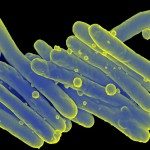Lien vers Pubmed [PMID] – 11925980
Trans. R. Soc. Trop. Med. Hyg. 2002 Jan-Feb;96(1):1-6
The small size of their genomes made bacterial ideal model organisms for the emerging field of genomics. Elucidating the genome sequences of mycobacteria was particularly attractive owing to the difficulties inherent in their manipulation. The slow growth rate, clumping, and requirement for category III containment make manipulation of Mycobacterium tuberculosis-complex strains laborious. M. leprae presents even greater problems as it has resisted all attempts at axenic culture. Availability of genome sequence data promised to accelerate our knowledge of the fundamental biology of these organisms, and to offer clues to the basis for their virulence, tropism and persistence in the host. This article will focus on what the genome sequences of M. tuberculosis and M. leprae have taught us about these pathogens, and how comparative genomics has exposed some of the fundamental differences between the species.

